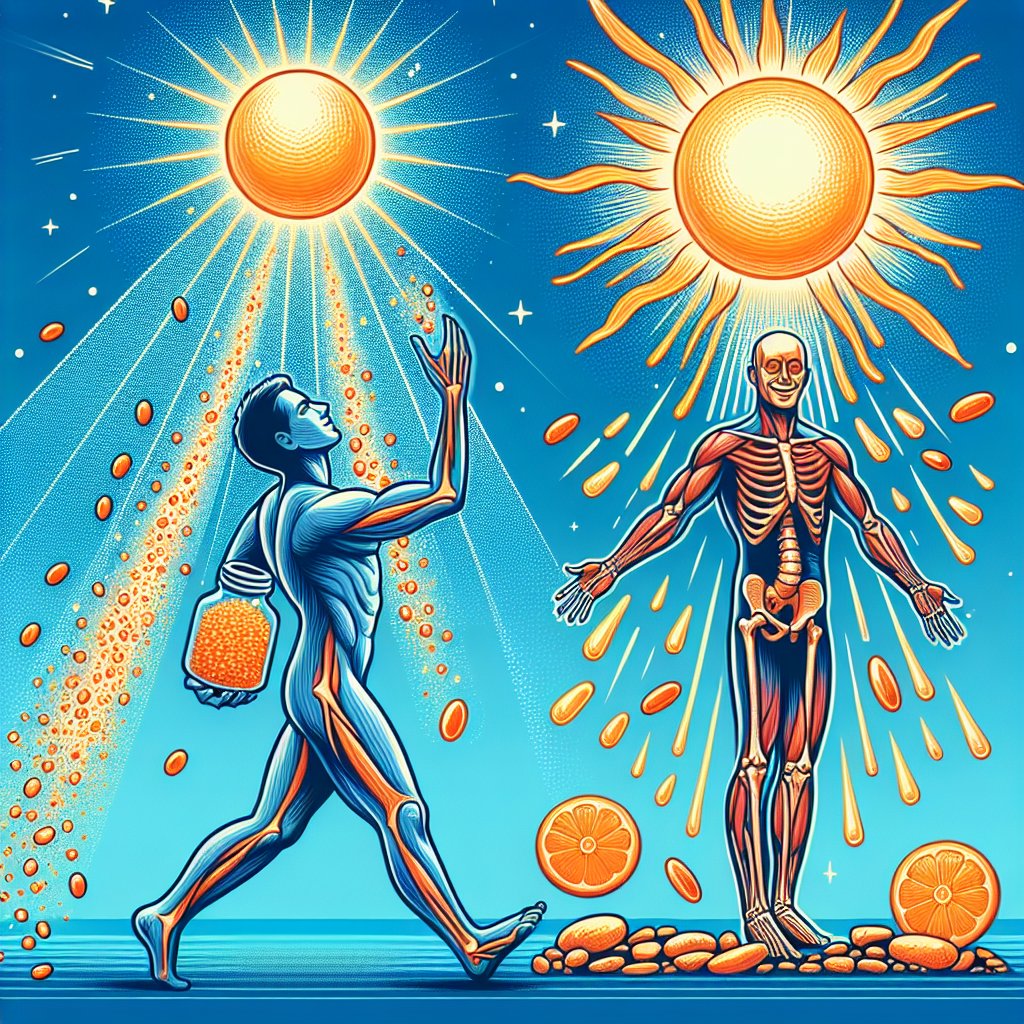Feeling Tired All the Time? Find Out: Does Low Vitamin D Make You Tired?
Feeling Tired All the Time? Find Out: Does Low Vitamin D Make You Tired?
Hey there, fellow keto enthusiasts! Have you been feeling more tired than usual? Well, it’s time to address the elephant in the room – vitamin D deficiency. Many of us are unaware of the crucial role that vitamin D plays in our overall well-being, including its impact on our energy levels. So, does low vitamin D make you tired? Let’s dive in and find out!
The Importance of Vitamin D
Vitamin D is often referred to as the “sunshine vitamin” because our bodies can produce it when our skin is exposed to sunlight. However, for those of us following the ketogenic lifestyle, our food choices can sometimes lead to lower than usual levels of this essential vitamin. But why is vitamin D so important?
Scientific research indicates that vitamin D is crucial for maintaining healthy bones, supporting the immune system, and even regulating mood. Additionally, it plays a significant role in energy levels and overall vitality. Low vitamin D levels have been linked to feelings of fatigue and low energy, which is something many of us can relate to.
As we embark on this journey to understanding the impact of vitamin D on our energy levels and overall health, you’ll be amazed at the vital role this sunshine vitamin plays in keeping us feeling our best.

Vitamin D Deficiency and Fatigue
Feeling tired all the time could be a sign that something is amiss with your health. One common but often overlooked factor is low vitamin D levels. Research has shown a strong link between low vitamin D levels and tiredness.
A study published in the International Journal of Environmental Research and Public Health found that individuals with low vitamin D levels are more likely to experience fatigue. The body’s cells have receptors for vitamin D, and when levels are insufficient, it can lead to feelings of tiredness and general fatigue, even impacting cognitive function.
So, how does vitamin D actually affect our energy levels? Well, it plays a crucial role in the mitochondria, which are the powerhouse of our cells responsible for generating energy. When vitamin D levels are low, it can hamper the efficiency of these energy-producing organelles, subsequently leading to feelings of tiredness and lack of energy.
If you often find yourself wondering, “Does low vitamin D make you tired?” it’s crucial to get your levels checked. If you are indeed deficient, increasing your vitamin D intake through sunlight exposure, diet, or supplements could potentially help alleviate feelings of tiredness and fatigue.
Symptoms of Low Vitamin D
Vitamin D is an essential nutrient that plays a crucial role in overall health and well-being. Its deficiency can manifest in various symptoms that may impact your daily life. Let’s take a look at some common signs and symptoms of vitamin D deficiency.
Feeling Fatigued
One of the most commonly reported symptoms of low vitamin D levels is persistent fatigue and feeling tired all the time. Research has shown that inadequate vitamin D levels can lead to feelings of tiredness and fatigue.
Muscle Weakness
Weakness in the muscles can be an indication of vitamin D deficiency. Studies have suggested that low levels of vitamin D can affect muscle strength, leading to weakness and discomfort.
Low Mood
Vitamin D is often referred to as the “sunshine vitamin” due to its association with mood regulation. Low levels of vitamin D have been linked to feelings of low mood and even symptoms of depression.
Frequent Illnesses
Individuals with low vitamin D levels may experience recurrent illnesses and infections. Research has indicated that vitamin D plays a crucial role in supporting the immune system, and its deficiency may increase the risk of frequent sickness.
Impaired Wound Healing
Inadequate levels of vitamin D can impact the body’s ability to heal wounds effectively. If you notice that your wounds are taking longer to heal than usual, it might be worth considering your vitamin D levels.
If you’re experiencing a combination of these symptoms, it’s essential to consult with a healthcare professional for appropriate testing and guidance. Addressing vitamin D deficiency can significantly improve these symptoms and enhance overall well-being.

Impact of Vitamin D on Energy Levels
Have you ever wondered why some days you feel like you could conquer the world, while on others, you struggle just to get out of bed? Well, one of the key players in this scenario might be the sunshine vitamin, also known as the mighty vitamin D. Let’s explore how vitamin D affects energy and overall well-being.
Research has indicated that vitamin D plays a crucial role in maintaining energy levels and overall well-being. When our bodies are deficient in this vital nutrient, it can lead to feelings of fatigue and low energy. In fact, a deficiency in vitamin D has been linked to symptoms such as muscle weakness, bone pain, and more importantly, constant tiredness. So, could low vitamin D make you tired? Let’s delve deeper into the science behind it.
The Science Behind Vitamin D and Energy
Vitamin D receptors are distributed throughout the body, including in areas of the brain that are involved in the regulation of mood and energy. When we have low levels of vitamin D, these receptors may not function optimally, potentially leading to feelings of fatigue and low energy levels.
A study published in the Journal of Endocrinology & Metabolism found that women with low vitamin D levels had an increased risk of experiencing fatigue. The study also suggested that optimizing vitamin D levels could help improve overall energy levels and reduce the risk of feeling tired all the time.
Boosting Vitamin D for Improved Energy
So, how can we ensure that we’re getting enough vitamin D to maintain our energy levels and overall well-being? First and foremost, exposing our skin to sunlight is one of the most natural ways to boost our vitamin D levels. Spending around 15-30 minutes in the sun a few times a week can help our bodies produce an adequate amount of vitamin D.
When sunlight is not readily available, incorporating vitamin D-rich foods into our diets can be beneficial. Fatty fish like salmon, cheese, and egg yolks are great natural sources of vitamin D. Additionally, fortified foods such as milk, cereal, and orange juice can also contribute to our daily intake of this essential nutrient.
For those who struggle to get enough vitamin D through sunlight and diet alone, supplementation can be a convenient and effective way to ensure adequate levels of this essential nutrient.
By understanding the impact of vitamin D on energy levels and taking proactive steps to maintain optimal vitamin D levels, we can potentially combat feelings of fatigue and embrace an overall sense of vitality and well-being.
Sources of Vitamin D
If you’re feeling tired all the time, one possible culprit could be low levels of vitamin D. This sunshine vitamin is essential for overall health and wellbeing. Our bodies can produce vitamin D when our skin is exposed to sunlight, but it can also be obtained from various natural sources. Including these sources in your diet can help increase your vitamin D intake and combat fatigue.
Natural Sources of Vitamin D
One of the best natural sources of vitamin D is fatty fish, such as salmon, mackerel, and tuna. These fish are not only delicious but also packed with this essential nutrient. Adding them to your meals can be a tasty way to boost your vitamin D levels.
Egg yolks are another great source of vitamin D. So, instead of opting for egg white omelets, consider enjoying whole eggs to benefit from their vitamin D content.
Mushrooms, especially those exposed to UV light during growth, are unique because they are one of the few plant-based sources of vitamin D. Including mushrooms like maitake or portobello in your dishes can add a flavorful dose of this important nutrient to your diet.
Furthermore, for those who follow a ketogenic diet, including foods like cheese and other dairy products can also help increase vitamin D levels. These sources can be versatile and incorporated into various low-carb dishes.
Increasing Vitamin D Intake
Aside from natural food sources, increasing your vitamin D intake can also be achieved through sensible sun exposure. Just 10-30 minutes of sunlight exposure to your arms, legs, back, and face, without sunscreen, at least twice a week can help your body produce an adequate amount of vitamin D.
Lastly, if you’re concerned about maintaining optimal vitamin D levels, consider speaking with a healthcare professional about potential supplementation.

The Role of Vitamin D Supplements in Combating Deficiency
One of the most effective ways to combat vitamin D deficiency is through the use of vitamin D supplements. These supplements play a crucial role in maintaining optimal levels of vitamin D in the body, which in turn can help in addressing the issue of feeling tired all the time.
Research has shown that low levels of vitamin D can indeed contribute to fatigue. In a study published in the Journal of Endocrinology, Diabetes & Obesity, it was found that individuals with low vitamin D levels were more likely to experience fatigue and muscle aches. This suggests that addressing vitamin D deficiency could potentially alleviate feelings of tiredness.
The Science Behind Vitamin D and Fatigue
Vitamin D plays a key role in various bodily functions, including muscle function and energy levels. When vitamin D levels are low, it can lead to muscle weakness and fatigue, making everyday tasks feel more taxing than usual. This can have a significant impact on overall mood and energy levels.
In addition, low vitamin D levels have been linked to conditions such as chronic fatigue syndrome and fibromyalgia, further highlighting the importance of maintaining adequate vitamin D levels for overall well-being.
Choosing the Right Supplement
When it comes to selecting a vitamin D supplement, it’s important to opt for a high-quality product that provides the necessary dosage. Vitamin D supplements are available in two forms: D2 (ergocalciferol) and D3 (cholecalciferol). Of these, D3 is considered to be more effective at raising and maintaining vitamin D levels in the body.
It’s crucial to consult with a healthcare professional to determine the appropriate dosage of vitamin D based on individual needs and existing health conditions. Additionally, regular monitoring of vitamin D levels through blood tests can ensure that supplementation is effectively addressing any deficiencies.
By incorporating vitamin D supplements into your daily routine in consultation with a healthcare provider, it is possible to combat vitamin D deficiency and alleviate associated symptoms of fatigue, ultimately helping you feel more energized and ready to take on the day.
Feeling Tired All the Time? Find Out: Does Low Vitamin D Make You Tired?
Diagnosis and Treatment
Do you find yourself feeling tired all the time? Perhaps you’ve been experiencing symptoms like fatigue, muscle weakness, or even bone pain. Could it be that you have a vitamin D deficiency? Let’s dive into how this condition is diagnosed and treated, shedding light on an important aspect of our overall well-being.
Diagnosing Vitamin D Deficiency
If you suspect that you may have a vitamin D deficiency, it’s crucial to consult a healthcare professional. Your doctor will likely start by discussing your symptoms and medical history. They may then recommend a simple blood test to measure the levels of vitamin D in your bloodstream. This test is often the gold standard for diagnosing vitamin D deficiency, as it provides an accurate snapshot of your body’s vitamin D status.
It’s important to note that the optimal level of vitamin D in the blood can vary among individuals, and healthcare providers often use a range of 20 to 50 ng/mL as a general guideline. Levels below 20 ng/mL are generally considered insufficient, while levels below 12 ng/mL indicate a deficiency. Interpretation of the results should be done by a healthcare professional, who will take into account various factors such as age, sex, and overall health.
Treating Vitamin D Deficiency
If the diagnosis confirms that you have low vitamin D levels, fear not! There are several effective ways to address this issue and restore your body’s vitamin D to healthy levels.
1. Sunlight Exposure
One of the most natural ways to boost your vitamin D levels is through safe sun exposure. Spending some time in the sun, particularly during the midday hours, can stimulate your skin to produce vitamin D.
2. Dietary Changes
Incorporating vitamin D-rich foods into your diet can also play a significant role in addressing deficiency. Fatty fish like salmon, tuna, and mackerel, as well as egg yolks and fortified dairy products, are excellent sources of this essential vitamin.
3. Supplements
In some cases, especially when natural sources and dietary adjustments are inadequate, healthcare providers may recommend vitamin D supplements. These supplements come in various forms and strengths, and your doctor can suggest the most suitable option for you based on your specific needs.
Conclusion
Diagnosing and treating vitamin D deficiency is pivotal in overcoming symptoms of fatigue and maintaining overall health. By working with a healthcare professional to determine your vitamin D levels and following their guidance on the suitable approach, you can effectively address this issue and regain your vitality.
Next, we’ll delve into the importance of vitamin D for overall health and its potential impact on energy levels. Stay tuned for an insightful exploration!

Prevention and Lifestyle Changes
If you’re constantly feeling tired, low vitamin D levels could be one of the reasons contributing to your fatigue. But the good news is that you can take steps to prevent this! Here are some tips and recommendations to help maintain optimal vitamin D levels and combat fatigue.
Get Some Sun
One of the most natural ways to boost your vitamin D levels is by getting some sun. Aim to spend around 15-20 minutes in the sun each day, preferably during the midday when the sun’s rays are the strongest. Make sure to expose a large area of your skin without sunscreen to allow your body to produce vitamin D.
Include Vitamin D in Your Diet
While it’s not always easy to get enough vitamin D from food alone, including vitamin D-rich foods in your diet can still help. Consider adding fatty fish like salmon, mackerel, and tuna, as well as vitamin D fortified foods such as milk, orange juice, and cereals to your meals.
Consider Supplements
If you struggle to get enough vitamin D from sun exposure and diet alone, talk to your healthcare provider about taking a vitamin D supplement. They can recommend the right dosage based on your individual needs and help you choose a high-quality supplement for optimal absorption.
By following these tips and making some simple lifestyle changes, you can help prevent low vitamin D levels and reduce the risk of experiencing prolonged fatigue. Remember, addressing vitamin D deficiency can positively impact your overall well-being and energy levels.
Conclusion: The Importance of Maintaining Adequate Vitamin D Levels
As we conclude our exploration of the link between low vitamin D levels and fatigue, it’s important to emphasize the critical role of maintaining adequate vitamin D levels for overall health and energy levels.
Overall Health
Scientific research has consistently shown that vitamin D plays a crucial role in supporting overall health. Adequate levels of vitamin D are essential for maintaining strong bones, supporting immune function, and regulating mood. Low vitamin D levels have been linked to a higher risk of depression, cardiovascular diseases, and autoimmune conditions. By ensuring that your body has sufficient vitamin D, you can support your overall health and well-being.
Energy Levels
Furthermore, maintaining optimal vitamin D levels is directly associated with maintaining adequate energy levels. Research has indicated that low levels of vitamin D could contribute to feelings of tiredness and fatigue. By prioritizing the maintenance of adequate vitamin D levels, you can boost your energy levels and combat the persistent tiredness that often plagues individuals with vitamin D deficiency.
Sunlight and Supplementation
The primary source of vitamin D is sunlight. Spending time outdoors and allowing your skin to be exposed to sunlight can help your body naturally produce vitamin D. However, factors such as geographical location, seasonal variations, and lifestyle can impact the body’s ability to produce vitamin D from sunlight. In such cases, supplementation may be necessary to ensure adequate vitamin D levels. Consult with your healthcare provider to determine the most suitable approach for maintaining optimal vitamin D levels.
It’s important to note that while sunlight is a primary source of vitamin D, it’s crucial to practice sun safety and avoid overexposure to harmful UV rays. Finding a balance between safe sun exposure and protecting your skin is key to reaping the benefits of vitamin D synthesis from sunlight.
In conclusion, prioritizing the maintenance of adequate vitamin D levels is crucial for overall health and combating fatigue. By being mindful of sun exposure and considering supplementation when necessary, you can ensure that your body has the necessary vitamin D levels to support your well-being and energy levels.


